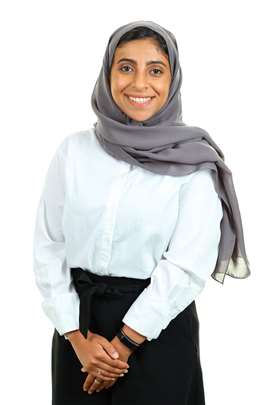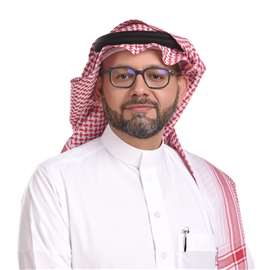Read this article in Français Deutsch Italiano Português Español
Engineering a better future for women in Saudi Arabia
05 January 2024
Over the last six years, the Saudi Arabian government has passed a series of dramatic reforms granting women freedoms previously prohibited under the country’s strictly-enforced Islamic law. Lucy Barnard speaks to Fatimah Habib, one of the country’s growing cohort of female engineers, to find out how she is benefitting from the changes
“Some things were tricky at the very beginning,” says Fatimah Habib, a project controls engineer working out of Bechtel’s new regional headquarters in Riyadh. “But I’ve had the support from my management, from my community and obviously the legal system allows it, so I have not personally felt any restrictions.”
A young engineer working on the US$22.5bn new six-line metro system due to open shortly in the Saudi capital, Habib is one of a growing number of Saudi engineers responsible for implementing the country’s ambitious Vision 2030 by constructing a startling number of megaprojects.
Perhaps even more surprising is that Habib is part of a growing cohort of female engineers – a profession which until just three years ago – was impossible for Saudi women to pursue in their own country.
 Fatimah Habib. Photo: SABCO
Fatimah Habib. Photo: SABCO
For Habib, who has lived abroad for much of her life, gaining her engineering degree in Cardiff in 2016 and a master’s degree in engineering project management at the University of Auckland in 2021, and has spent the last two years as an associate at New Zealand-based infrastructure specialist Frequency, life as a female engineer in Riyadh is no different to working in the West.
She says that her current role as a reporting engineer in Riyadh involves similar work to her previous role – updating senior management and clients on construction progress and budget levels.
“Engineering is male dominated everywhere,” she says. “Working in Riyadh is not that different. I’ve worked overseas, I can compare both experiences.”
Yet while Habib, who turns 30 next month, was growing up, Saudi Arabia had one of the lowest female labour force participation rates in the world. Women were subject to strict rules governing where they could go, what they could wear and requiring them to seek permission from a male guardian to undertake many everyday activities.
In 2016 the Saudi government launched Vision 2030, Crown Prince Mohammed bin Salman’s economic and social reform plan. Since then, the government has rushed through a series of dramatic changes, lifting the decades old ban on women drivers, loosening the dress code, requiring equal pay and, in 2020, allowing women to work in “hazardous jobs and industries.”
The effect has been dramatic. In 2017, the year after Vision 2030 was launched, women made up 17.6% of the Saudi workforce. But by 2021, that figure had grown to 35.6%. Indeed, today, according to Bechtel, 27% of all the Saudi nationals working for the company in KSA are women.
How has Vision 2030 changed Saudi women’s lives?
In terms of education and training, the transformation has also been just as dramatic. Before 2006, no universities in the country would accept female engineering students and any Saudi girls wishing to study the subject had to travel abroad to do so. However, since then engineering faculties around the country have slowly been opening up to women.
“I actually fell into engineering,” says Habib. “I was destined to do medicine, but I wanted something that combined maths and science and art. So, I started with architecture and then halfway through the application, I thought about architectural engineering. It felt like the right fit. So, I fell into it, and then I loved it.”
Today, although the numbers of Saudi women studying engineering and other STEM subjects at university remains lower than the number of men, the gender gap is in fact one of the smallest in the world.
According to the Organisation for Economic Cooperation and Development (OECD), in 2021, 41.6% of women in college and universities in Saudi Arabia graduated in subjects in the field of science, technology, engineering and maths - the fourth highest out of all the countries on which it collects data.
 Riyadh Metro. Image: Ali Alawartani via Adobe Stock
Riyadh Metro. Image: Ali Alawartani via Adobe Stock
“In my cohort at Cardiff University, there were quite a few Arab women studying engineering. We were the majority of women there,” says Habib. “There was quite a push at the time from our region to get more women into STEM. Of course, that was accompanied by some concerns about what it would look like in the future but there was genuine belief that things were changing so that by the time we graduated there would be opportunities which evidently has happened.”
And the official figures bear this out. According to UNESCO, in 2021, the country with the highest proportion of female engineers was Algeria where they accounted for 48.5% of all engineering graduates. It was followed by Tunisia (44.2%), Syria (43.9%), Oman (43.2%) and Morocco (42.2%).
Yet around the world, only 13% of female tertiary graduates studied STEM subjects in the OECD on average, compared with 30% of male tertiary students graduating with STEM degrees. In the USA the situation is even more stark with just 12% of female higher education students and 30% of male higher education students graduating with STEM degrees.
Although the number of qualified female engineers working in Saudi Arabia remains low, employers say it is growing quickly.
“Everything in Saudi is unusual because three years ago we did not have the chance to employ women engineers,” says Habib’s boss, Abdul-Rahman Al-Ghabban, president of Saudi Arabian Bechtel Company (SABCO). “Hiring women was not something we had the option to do a few years ago because there were no women we could hire. This opportunity to tap into really untapped talents just happened after Vision 2030.”
“For all of these things that we’re talking about, it’s the first time, so the excitement levels for hiring women in general and Saudi engineers in particular are really high. It’s something new for us all because the opportunity was not here five years ago.”
Saudi university courses opening to women
“After the after the vision was launched, probably out of five, seven years ago, a lot of colleges and universities, they start opening, opening engineering departments for women and now we’re starting to see the product of that,” Al-Ghabban says. “Thousands of Saudi women went to school in the UK and the US. Some of them opted for engineering and so we and we’re hiring from that pool of talent.”
Al-Ghabban says that at another of the megaprojects on which Bechtel teams are currently working, the high profile Neom scheme, there are currently 200 female engineers, of which roughly half are Saudi nationals.
“Neom is unique in terms of size and nature. Perhaps it has more women than some of the more established engineering projects because it’s a new project just starting so these are all new positions. I cannot think of an engineering discipline where I could not see a Saudi woman engineer working there. They drive to site by themselves. They wear safety hats and PPE like everyone else. I believe they are in almost every discipline - in the construction field, engineering contracts, quality, health and safety. But it is just one example of the megaprojects being built across the country. If you come to Riyadh, you will see the same as well,” he says.
 Abdul-Rahman Al-Ghabban, president of Saudi Arabian Bechtel Company (SABCO). Image: Bechtel
Abdul-Rahman Al-Ghabban, president of Saudi Arabian Bechtel Company (SABCO). Image: Bechtel
Al-Ghabban points to the growth of the Saudi Women Engineers Society as a case in point. The society, which was started by 16 female Saudi engineers on social media just over a year ago, currently boasts more than 400 registered members and more than 10,000 followers.
In November, Saudi Arabia Bechtel Company (SABCO), Bechtel’s Saudi arm, agreed to support the recently formed not-for-profit organisation by providing its members with educational talks, mentorships and information about current job opportunities.
“This society would not have existed a couple of years ago because women have not had the opportunity to open their own society,” he says. “Seeing how bright and competitive and how, how eager to these young women are to do something, it’s really refreshing. There is so much eagerness to come and explore something new.”
Separately, this year SABCO also launched a returnship programme aimed at encouraging professionals who have taken a career break of two years or longer back into the industry.
Habib is currently working on both putting in place the next steps of her ambitious career plan as well as working to smooth the path for those following after her.
Empowering others
“I would love to step into infrastructure management,” she says. “I’ve started crafting a career path and I’m starting to identify the gaps of what I need to do. What helps me within Bechtel is having mentorship and sponsorship programmes, so I’ve got people to look up to who are open to supporting me. Throughout my career I’ve had this idea in the back of my head that it might be a little bit hard for me now, but I want to make sure it’s easier for someone that follows me.”
“I think that within five or ten years we could well see equal numbers of male and female engineers in the country,” she adds. “I think that we’re starting at a position that globally women in engineering haven’t had the privilege to enjoy and we’ve got support from every layer – universities, employers, government. We’ve currently got a cohort of women engineers that are becoming seasoned professionals. I think it’s going to be incredible.”
STAY CONNECTED


Receive the information you need when you need it through our world-leading magazines, newsletters and daily briefings.
CONNECT WITH THE TEAM











